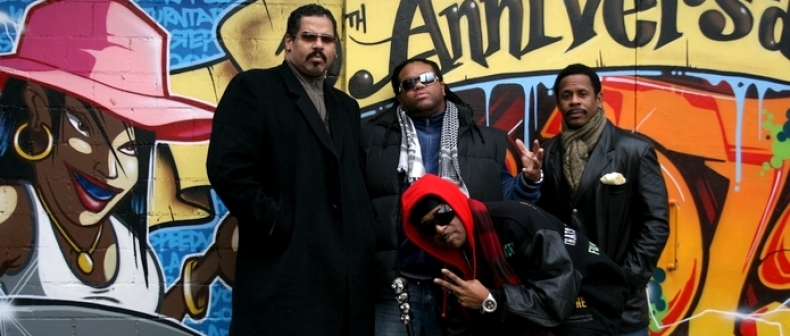
Image: TIFF
“I said a hip, hop, a hippie, a hippie, to the hip hip hop, you don’t stop…” The opening words to the Sugarhill Gang’s 1979 hit “Rapper’s Delight” are indelible to a generation of people as the first hip-hop song they ever heard and probably memorized, all 15 minutes. While hip-hop culture had been percolating and developing from its origins in the South Bronx throughout the ‘70s, “Rapper’s Delight” was unquestionably the song that announced the existence of rap music to the world, topping the charts in Europe and Canada while becoming the best-selling 12-inch ever at the time. Though the Sugarhill Gang had other notable hit singles, such as “8th Wonder” and “Apache,” it was the exuberant rhymes of “Rapper’s Delight” that virtually captivated the world. And it is this song, given all the controversy associated with it, whose song title in many ways couldn’t be further from the truth.
According to MC Wonder Mike, Sugar Hill Records, a label started by the husband-and-wife team of Sylvia and Joe Robinson, not only registered “Sugarhill Gang” but also the stage names of his fellow group members. Essentially, Wonder Mike could not call himself Wonder Mike anymore. It all culminated in an eyebrow-raising twist, with imposters performing shows as Master Gee and Wonder Mike under the Sugarhill Gang moniker.
This sorry saga is chronicled in I Want My Name Back, a documentary by Roger Paradiso screening tonight at the TIFF Lightbox. “We got tired of turning on the TV to different music shows and seeing everyone else tell about our story,” explains Wonder Mike, who comprises, along with Master Gee and Henn Dogg, an entity that can only be referred to now as the Original Sugarhill Gang. “And it was inaccurate. You had some haters, and you actually had people in our corner, but the facts didn’t quite line up.”
As far as “Rapper’s Delight” is concerned, Wonder Mike is right in the sense that a number of stories about the origins of the track have circulated. The one tale that has lingered the most centres around the authorship of the lyrics, often linked back to legendary MC Grandmaster Caz, a member of the pioneering crew Cold Crush Brothers. According to the trio, the fault lies with Big Bank Hank, a bouncer and manager for Caz’s group who was featured in the original lineup of the Sugarhill Gang. Hank’s rhymes were actually Grandmaster Caz lyrics he had memorized. Hank’s audition for the Sugarhill Gang, wearing a dough-and-flour-stained apron in a car outside the pizza parlour where he worked, is one of the more strikingly surreal scenes described in Dan Charnas’ The Big Payback, an exhaustively researched and compelling tome on the business of hip-hop.
In the book, Wonder Mike and Master Gee happened upon the impromptu street audition, and after throwing down their own rhymes they were invited to be part of the group that ended up being called the Sugarhill Gang. Clarifying their roles, Wonder Mike and Master Gee maintain that they wrote their own rhymes. “Everything that Wonder Mike said on ‘Rapper’s Delight,’ he wrote,” says Master Gee forcefully. “Everything that I said on Rapper’s Delight, I wrote. Grandmaster Caz wrote everything Hank said. Because Caz is telling everybody he wrote Hank’s raps, the legend started going that he wrote most of the song. That’s just not true.” In The Big Payback, Grandmaster Caz tosses Big Bank Hank his book of rhymes when the latter says he’ll be recording with Sugar Hill Records, because the idea of hip-hop on wax was so outlandish at the time. So what relationship do Wonder Mike and Master Gee have with Big Bank Hank at this time? “We don’t have one,” is Wonder Mike’s curt response.
The music on the single was also a contentious issue, because Sylvia Robinson recruited a group to replay Chic’s massive hit “Good Times” as the backing track for what turned out to be “Rapper’s Delight” — before enlisting the Sugarhill Gang. Her approach eschewed the role of the DJ that contemporary hip-hop parties revolved around while raising the ire of Chic themselves, who successfully sued the label.
Despite the issues of attribution and ownership that swirled around “Rapper’s Delight,” its significance is much weightier now than it was over 30 years ago, when the song could have easily been seen by unversed outsiders as a novelty record from a flash-in-the-pan genre. Hip-hop has helped to provide an outlet for disenfranchised voices and creative expression. In a genre where self-articulation and self-definition are central, sometimes misinterpreted as egoistical, the title I Want My Name Back takes on even more import.
“Rapper’s Delight” was recently ushered into sharp focus again with the passing of Sugar Hill Records’ Sylvia Robinson in late 2011. Despite their differences with members of the Robinson family who were involved in Sugar Hill Records at various levels, Wonder Mike and Henn Dogg attended the service. They appreciate what the woman who has been called “the mother of hip-hop” achieved. “She had an ear for a hit record,” Wonder Mike says. “No doubt about it, you can’t take that away from her,” says Hen Dogg. “Getting down to the artistry of the person, she was phenomenal,” says Master Gee. “It’s a shame that she’s not gonna get the credit that she truly deserves because of their reputation.” Robinson does deserve credit for helping to usher rap music into the mainstream, and on the record, it’s apparent the group was aware they were moving into unprecedented territory.
For the Sugarhill Gang themselves, though, the fruits of the song and their career are a mixed blessing. “I personally look at “Rapper’s Delight” as a battering ram,” says Wonder Mike. “People like to say, ‘Well, you didn’t invent rap.’ Well I never said I invented rap.” He continues in a passionate tone: “We were on Solid Gold, Soul Train and American Bandstand and we handled ourselves like men. And that kicked the door open for everyone else to come in and get a deal somewhere and eat at the hip-hop table. That’s what ‘Rapper’s Delight’ did. It opened the door for everyone.” Ultimately, “Rapper’s Delight” is more than a cultural signpost; it irrevocably affected the lives of these men, writing their inarguable place — and names — in history. “It’s a blessing and a curse, I ain’t gonna lie to you,” says Master Gee. “Rapper’s Delight’ is a blessing and a curse for me.”
____
Del F. Cowie is an Assistant Editor at Exclaim!, where he writes about hip-hop and rap.
For more, follow us on Twitter at @torontostandard, and subscribe to our newsletter.














